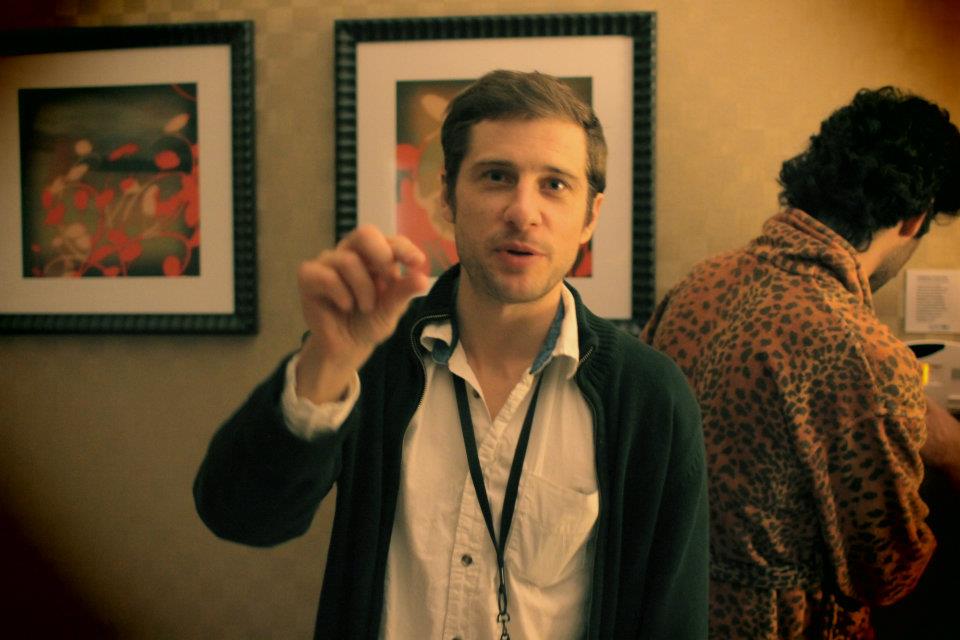 Back to selection
Back to selection
Independent Film: Hobby or Career? Kentucker Audley on the Eternal Question
 Kentucker Audley
Kentucker Audley Independent filmmaking: hobby or career? It is a question that has been on more than a few lips for years now. Though digital platforms have greatly democratized the distribution process, filmmakers are still reaping minimal financial returns on their work. Should the aspiring independent filmmaker pursue her passion wholeheartedly, or should she be pragmatic from the get go, making films as a hobby alongside a more lucrative career? Filmmaker spoke with Kentucker Audley, filmmaker, actor and proprietor of NoBudge, about the professional concerns of the modern moviemaker, and the benefits of having yet another passion project to keep you busy.
Filmmaker: If you could contextualize for us a bit, how and when was NoBudge born in relation to your career?
Kentucker Audley: I started NoBudge in early 2011 after I directed my first three films. I thought [my most recent film] Open Five 2 accomplished what I had been working towards, and I wanted to try something different. It started because I began to see that film festivals weren’t programming some of the most interesting films, and that left many films without a place to screen.
Filmmaker: Did you have any programming experience?
Audley: No, I didn’t. But I didn’t think of NoBudge initially in terms of programming, it was more a compilation. I was just trying to compile the best free films I found on YouTube and Vimeo.
Filmmaker: You run NoBudge as a hobby, with no ad space or revenue aside from the submissions fees that go directly back into the site. Is this a deliberate choice? Would you consider a revenue stream if the opportunity arose?
Audley: Absolutely, it’s deliberate. Making money off a small indie film is nearly impossible. Maybe you can make some money for the middleman — an aggregator or distributor — or, if you self-release, you can make a small amount by begging family and friends. But to me, if it’s a decision whether to make $1,000 or have the film available to anybody for free, that’s an easy choice. You spend two years making it and if all you can make back is $1,000, I think you’re still in the audience-building stage. I’m working from the assumption that making your film available for free is the best way to build an audience.
If you want to make money on your films, it’s a different game from the absolute first decision you make. Often young filmmakers think they can have it all: they can make an uncompromising film, they can cast unknown actors, they can stay clear of Hollywood agents or investors or publicists, and that, magically, they can still make money from their film. I’m not saying it’s impossible. Look at Shane Carruth. He’s outside the system more than anybody, and he still found a way to be successful with Upstream Color. But he’s got a cult following, and that’s an incredibly rare exception.
To address the second part of the question, sure, I would consider a revenue stream for NoBudge if it felt right, and I was working with a team of people. At this point, I’m careful not to overextend the mission of NoBudge, because I still want to give myself room to act and direct.
Filmmaker: With the sheer amount of time it can take to get a project off the ground, how important do you feel it is for independent filmmakers to have a creative outlet, a hobby, outside of their next film? Has NoBudge served you in this sense?
Audley: Yes, it’s been helpful for me in that regard. It’s easy to get locked in to what you’re doing and lose the big picture. I’ve looked at NoBudge as a film distribution research opportunity.
And yes, generally anytime you’re spending time outside of your immediate pursuit, you’re gathering valuable insight into a wider world.
Filmmaker: Nowadays there is a lot of talk about whether or not “independent filmmaker” is a viable career option. I’ve spoken with successful and recognizable names, who are still broke and living from grant to grant. Others maintain white-collar jobs while making films in their vacation time. It’s different for everyone, but what’s your take on this? Can filmmaking on the level you choose to pursue it be a career in and of itself?
Audley: Yeah, very few people are making a living as an indie filmmaker. I certainly have never made any money directing my films. I’ve made my living acting, and doing jobs outside the industry. It was a sharp blow to realize I couldn’t make money from my own films, but it was good for me, and made me realize how hard you have to fight. You need persistence.

Filmmaker: Mentally, what is the best way to consider it? As a career, or a hobby? Should filmmakers be prepared from the outset to earn a living outside of film, or should they pursue it full steam ahead?
Audley: It depends on what type of films you want to make. If your films are popular in a mainstream way, you’re looking at a career. But if you tend towards the slow, arty or experimental film, you’re probably going to need to support yourself elsewhere. It’s important to be honest with yourself. If you haven’t been accepted into major film festivals, or aren’t represented by a big Hollywood talent agency, or you don’t have millions of YouTube views, you’re probably not very close to making a living.
Filmmaker: Though investors’ wallets are tighter, do you think that new distribution and media platforms have made it easier for filmmakers to turn a profit? Or were they better off in the early 2000’s, before the digital revolution?
Audley: I’m not an expert on what was happening in the early 2000’s, but I’d guess it’s harder now because they are so many more films and the industry is in complete transition. Of course, the transition period can be great for some enterprising filmmakers. Joe Swanberg’s Drinking Buddies is a great example. It went straight to iTunes and has been near the top of their best sellers for a month.
Filmmaker: Aside from platforms like NoBudge, which promotes films that may otherwise go unseen, what are some avenues that independent filmmakers could afford to see more of in the marketplace? Even beyond showcasing platforms, what are some things aspiring filmmakers need?
Audley: There are plenty of tools. I like what these new pay-per-view viewers, like VHX and Chill, are doing. Vimeo has obviously been paving the way for a long time. I would love to see people get used to buying Indies through Vimeo or VHX, platforms which are more filmmaker-friendly. Other places like Yekra, Indie Reign and Distrify are doing the same thing. I haven’t been through the whole payment process with all of them, but that’ll be a big deciding factor on which one I would use and encourage other NoBudge films to use. The one with the easiest process to make a purchase, and one that’s embeddable, so we can post directly to our NoBudge site.
Filmmaker: For those who are more hesitant regarding alternative distribution, the role of the Internet, and so forth, would you say adapt or perish? As we move forward, is it possible to continue small-scale filmmaking without engaging the opportunities available across new media?
Audley: It’s a good question. Some people are just not computer people, and they don’t want to spend their day on the Internet figuring this stuff out, and that’s completely understandable. I don’t know if you perish. It may not be a bad thing to be left out for a while. Most of these battles are temporary. Maybe if you look at it long-term, always being on the cutting edge won’t mean so much.
